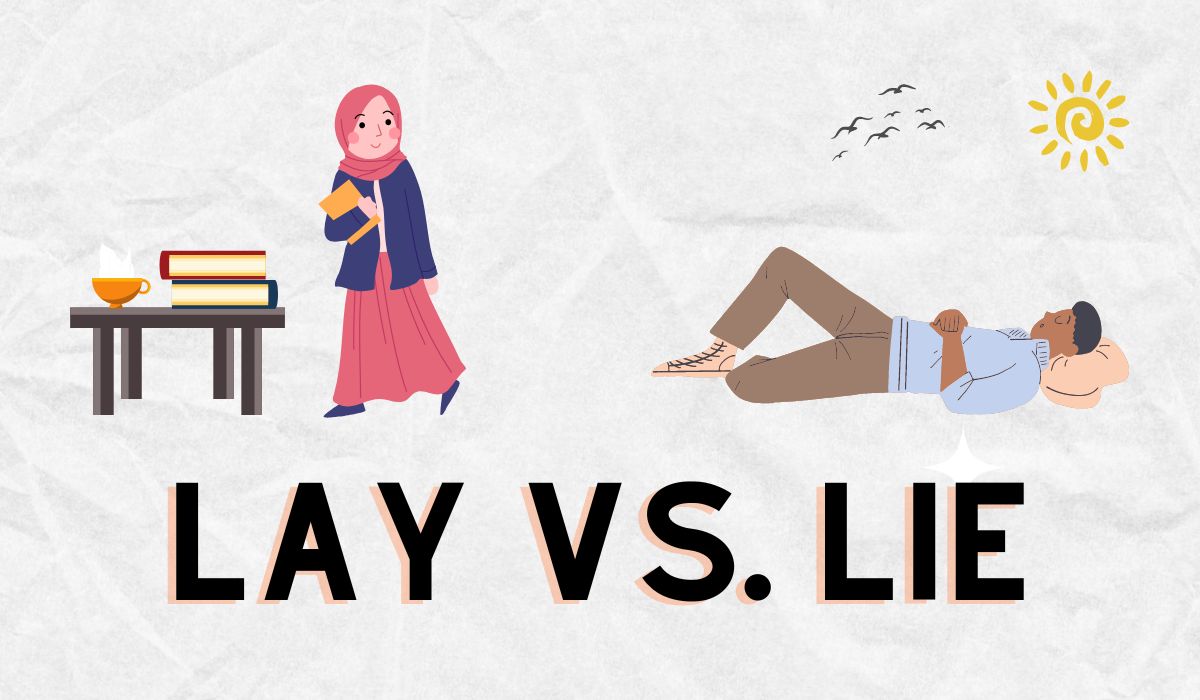At the end of yoga class, the instructor will ask you to lie down on your mat for a final resting pose. Or is it lay down?
In a list of confusing English words, lie and lay certainly rank toward the top, and in an unusual way. They’re not exactly homophones, like compliment and complement, which sound the same but have different meanings. And they’re not exactly different spellings of the same word, like grey and gray. They are two different — but similar — verbs with two different meanings. And this is exactly why they tend to confuse the heck out of people.
Here we’ll break down the different uses of lie and lay in present tense, past tense, and past and present participle.
Lie vs. Lay: The Basics in Present Tense
Lie and lay are present-tense verbs. We’ve already established that they have similar meanings, but not the same meaning. Lie means “to rest or recline” whereas lay means “to put or to place.”
Present tense lie and lay examples:
I am tired after karate chopping wooden boards all day, so I’m going to lie down on the couch. Please lay my black belt on the table.
When using the verb lie, we’re referring to the subject of the sentence: I lie down/I am lying down.
When using the verb lay, we’re referring to placing the object of the sentence: I lay the black belt on the table. I am laying the black belt on the table.
Past Tense: Lay vs. Laid
Okay, feeling ready for a twist that is a stumbling block for many? Here it is: The past tense of the verb lie is lay.
Yikes, right?
Fortunately the past tense of lay is not out to trick you. The past tense of lay is laid.
Past tense lie and lay examples:
I lay down prone on the table so the artist could tattoo Justin Bieber’s face on my back.
I laid the photo of Justin Bieber on the table so the artist could tattoo it on my back.
Two common errors when using the verb lie in past tense are lied and laid. Sure, these are both words in the English language, they just are not the past tense of the verb to lie when we’re referring to resting or reclining (as opposed to the verb lie that means to tell a fib).
Past tense lie example:
INCORRECT: I laid down in the grass to daydream about Justin Bieber.
CORRECT: I lay down in the grass to daydream about Justin Bieber.
Past and Present Participle: Lain and Laid
When we use the helping verb have or had with lie and lay, the verb lie changes again, whereas lay remains the same as its past tense form. With the verb has or had, lie becomes lain. Lay becomes laid.
Lie and lay with have/had:
I have lain in bed for hours, lamenting that my box of chocolates is nearly empty.
I had laid the box of chocolates on the bed to eat while binge watching Stranger Things.
Trick to Remembering Lay vs. Lie
The key to remembering the difference in meaning between lie and lay is that when using the word lay, we are always referring to putting or placing an object or thing. When you use the word lie, you can’t lie an object.
Lie means recline.
Lay means to place.
When you say these words out loud, their similar vowel sounds create a mnemonic to help you remember which is which.

Susan is an English educator, editor, and writer who has enjoyed working within these fields since 2004. Her experience includes teaching at the high school and adult continuing education levels, and writing and editing for multiple regional publications, including Wrightsville Beach Magazine and Encore Magazine. Today she is a copywriter and editor for CastleBranch Inc., as well as editor in chief for the company’s internal e-magazine. A Southern transplant who moved from Ohio to North Carolina, she has embraced the word “y’all” and can tell you how she likes her grits. Check out her official website.








